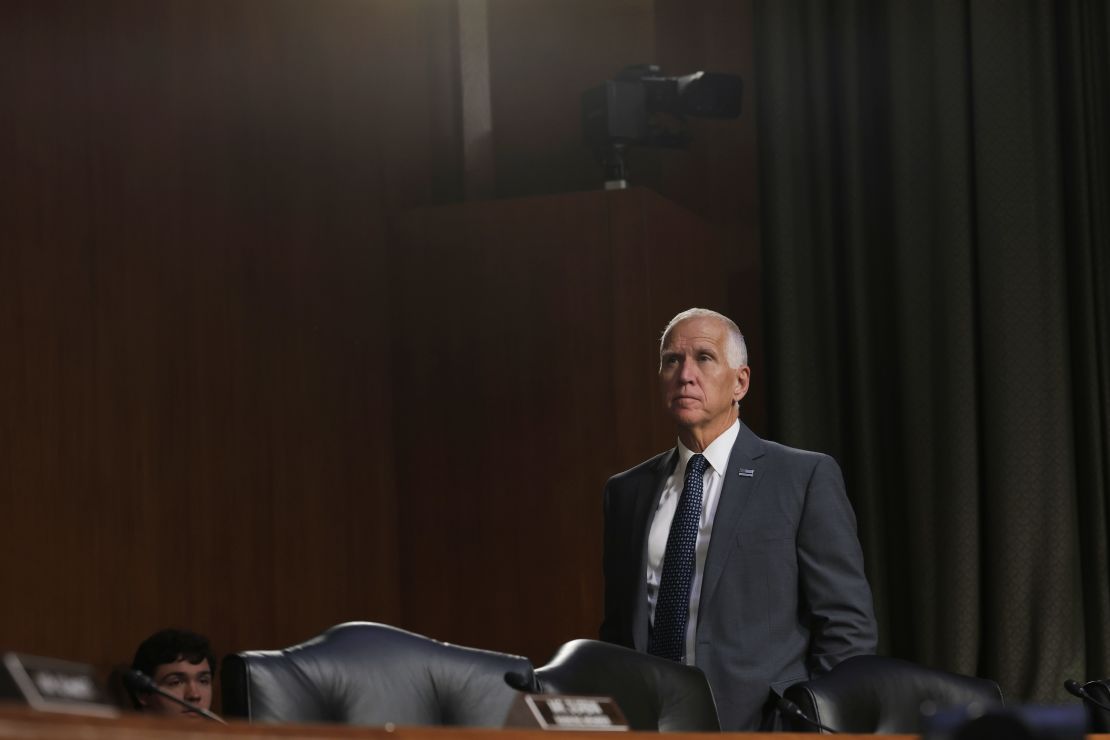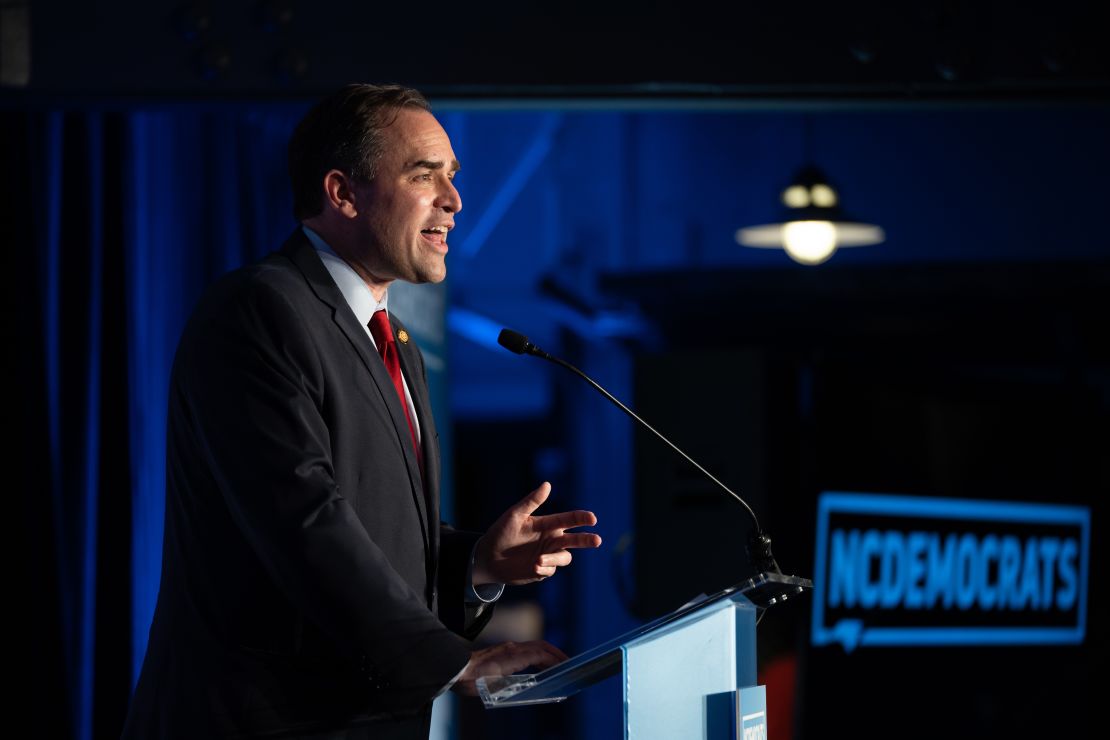CNN
—
When the executive committee of North Carolina’s Democratic Party passed a resolution in June calling for an immediate arms embargo on Israel, it set off another episode in the party’s ongoing struggles with how it addresses the Israel-Hamas war.
Some Jewish Democrats in North Carolina said the resolution was consistent with their support of Palestinian human rights while others characterized it as divisive. The resolution’s backers are talking to Democrats in other states who want to take the same stand. And top state leaders – notably the party chair and North Carolina’s Democratic governor – have declined to comment.
The Israel-Hamas war still divides the party as it did before the November election, when Democratic nominee Kamala Harris faced protests and boycott threats from parts of the base before eventually losing to President Donald Trump.
In North Carolina, where Sen. Thom Tillis’ retirement opened an opportunity for Democrats to flip a Republican-held seat, some in the party are worried the disunity will make it harder to compete in a race they almost certainly have to win next year to regain Senate control.

“This is an issue that’s going to divide Democrats at a time when Democrats need to be working together on the issues that voters actually care about, the kitchen table issues,” said Kathy Manning, who chairs the Board of Directors for the advocacy group Democratic Majority for Israel.
Alan Smith, a lead sponsor of the resolution and a member of the state party’s progressive caucus, sees it differently. Passing the resolution, he argues, shows the party is responsive to the will of Democratic voters.
“I think it’s only going to help the Democratic Party. It’s going to get people to come back,” Smith said.
According to a May survey from the Chicago Council on Global Affairs, Democrats younger than 45 are far less likely than their older partisan peers to favor the US supporting Israel militarily, with only 38% saying they favor military support until the hostages are returned, compared with 48% support among older Democrats.
Disputes over the war have shaped other Democratic races, notably the New York mayoral primary, where Zohran Mamdani, a democratic socialist and strident critic of Israel, scored an upset victory despite criticism from some Jewish groups that he hadn’t sufficiently denounced antisemitism.
And in Michigan, where Democrats hope to retain control of an open Senate seat next year, the main candidates in the primary have taken sharply different positions on the war. Trump flipped Michigan in 2024 in part by capitalizing on anger in both Jewish and Arab American communities.
Though other Democratic state parties, in Wisconsin and Washington, have recently passed resolutions critical of Israel since the country launched its war against Hamas following the Oct. 7, 2023, attack, the language passed by North Carolina Democrats is the only example that explicitly calls for an embargo on military aid and weapons transfers and accuses the state of committing genocide and apartheid.
“The military resources that have been made available to Israel through annual and emergency military aid have been used to commit the crime of genocide and other war crimes in Gaza,” it reads.
“The North Carolina Democratic Party supports an immediate embargo on all military aid, weapons shipments and military logistical support to Israel,” it continues.
The resolution also won the support of NCDP’s African American Caucus, the Arab Caucus, the LGBTQ+ Caucus, the Association of Teen Democrats, the Jewish Democrats and various other groups within the state party.
Israel rejects claims that its war against Hamas, which killed 1,200 people in the Oct. 7 attack and still holds Israeli hostages, constitutes a genocide. It also rejects allegations that its treatment of Palestinians in Gaza and the West Bank is akin to apartheid. Earlier this month the Gaza Health Ministry reported the Palestinian death toll had passed 58,000, with the most recent rounds of casualties taking place near food distribution sites.

Manning says Democratic Majority for Israel is in conversations with Democratic voters across the state and helping them to make their displeasure with the resolution known to state party leadership.
The resolution’s advocates worked over a multiyear process to get the statement passed, starting at the local precinct level, on to the county convention, then through the congressional district convention, the platform resolutions committee and ultimately the party’s state executive committee.
“We see it as an issue of unity and an issue that is local, because we want taxpayer dollars to be invested here, and we believe that speaking up for human lives, including Palestinian lives, is actually a local issue and is a reminder that when grassroots groups come together, that they can accomplish the things that they wish to see within their party,” said Reem Subei, chair of the party’s Arab Caucus.
Since the resolution’s passage, Subei says those engaged with their state-level executive committees have reached out to her asking how they could mirror this effort, including organizers in Texas, Oklahoma and Minnesota.
Lisa Jewel, president of the state Democratic party’s Jewish Caucus, condemned the resolution as divisive and leaned on leadership to block the effort.
“Our leadership needs to call these extremists out. They need to take a strong stand against antisemitism. By placating these extremists, it helps raise the drum beat that leads to violence,” said Jewel, arguing that state Democrats should be focused on cuts to Medicare and Medicaid, women’s reproductive health, the cost of housing, gerrymandering, and other consensus-driven issues. She also voiced fear in the wake of threats against her own synagogue.
The Jewish Caucus was created last year in response to what Jewel described as growing antisemitism in the Democratic party and across North Carolina. This is not to be confused with the state party’s Jewish Democrats, a separate group that supported the resolution.

For a long time, party leadership resisted religious groups creating their own caucuses and wanted the groups to all fall within the Interfaith Caucus out of fear of these very types of disputes, but Jewel says some Jews did not feel welcome in the interfaith group and insisted they would go out on their own.
“It is not feasible for us to disconnect our Judaism from Israel, regardless of the politics that are happening there. It’s just part of who we are,” said Jewel.
Mark Bochkis, who leads communications for the Jewish Democrats, said he moved to Greensboro as a child from the former Soviet Union and that his extended family lives in Israel.
“We have to take a look at what wins statewide, and we cannot ignore the will of Democratic voters or their values. And their values right now are saying we care about Palestinian human rights,” Bochkis said.
“This is the new North Carolina Democratic Party. This is the way forward. I think the Jewish Caucus represents kind of a view that we’re moving past,” he added.
The next flashpoint will be if or when the resolution is ultimately adopted into the party platform. Its supporters believe they have cleared all the necessary procedural hurdles and that it will eventually be a part of the party’s mission statement, but its opponents argue party leadership can still block that from happening. The timeline for when the platform will be voted on is unclear.
There is no readily available record of who supported the measure and no video or even mention of the proceeding on the state Democratic Party’s website, though proponents of the resolution say it passed 161-151.
According to people who attended the vote, party chair Anderson Clayton and other party officers abstained. Clayton has not commented publicly in local press in the weeks since the resolution passed and declined to speak to CNN.
Gov. Josh Stein, the state’s first Jewish governor, and his predecessor, Roy Cooper, who many state and national Democrats are pushing to run for Tillis’ open Senate seat, also declined requests for comment. An adviser to Cooper told CNN that he generally does not opine on party resolutions.

Former US Rep. Wiley Nickel, who is already running for Tillis’ seat, dismissed the resolution as one-sided but also criticized the Trump administration and Israeli Prime Minister Benjamin Netanyahu.
“In an issue as complex as this, nuance is essential, and that’s something politics often overlooks. You can look at my record and see I’m a staunch supporter of Israel as a key U.S. ally, but I also care deeply about the suffering of innocent civilians in Gaza. The current approach by Trump and Netanyahu is not leading us toward peace or a two-state solution. Instead, their policies are fueling division and perpetuating violence, making a two-state solution seem more out of reach than ever,” said Nickel in a statement to CNN.
And Rep. Don Davis, a Democrat on the House Armed Services Committee who could also mount a Senate run, reaffirmed his commitment to Israel as an ally of the United States.
“I believe that providing support to our allies, including Israel, is essential in our commitment to countering the threats posed by the Iranian regime and its associated terrorist proxies,” said Davis in a statement to CNN.
The headline of this story has been updated.

